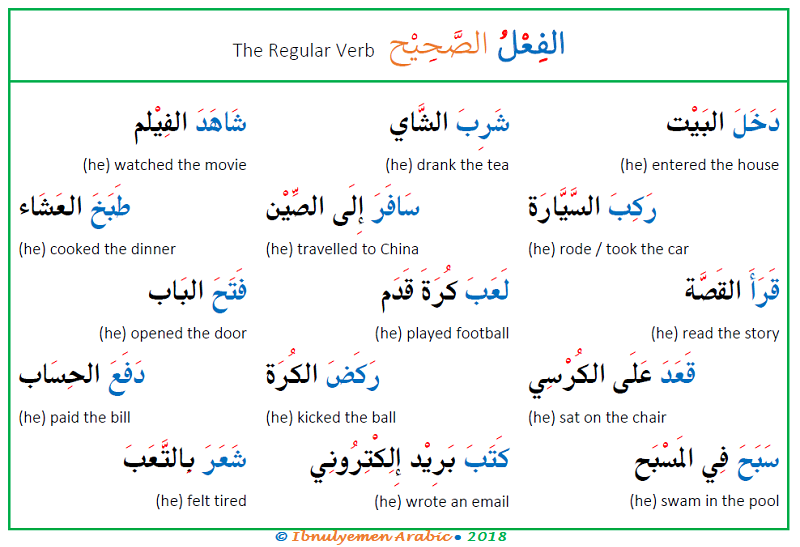
Arabic, a rich and expressive language, boasts a wide range of verbs that are essential for everyday communication. Understanding these common verbs is crucial for anyone learning the language, as they form the backbone of most sentences. In this article, we’ll explore some of the most frequently used Arabic verbs, their meanings, and how they are used in context.
Al-Dirassa Institute offers an extensive range of online Quran interpretation courses, meticulously designed to cater to both beginners and advanced learners, ensuring that every student gains a profound understanding of the Quran’s messages.
Don’t want to go through the translation anymore?
30 free minutes with your qualified Egyptian teacher.
One of the most fundamental verbs in Arabic, “كانَ” is the equivalent of the English verb “to be.” It is commonly used in past tense to describe a state or condition:
– Example: كان الجو حاراً. (kāna al-jaw ḥāran.) – The weather was hot.
“ذهبَ” is another essential verb, meaning “to go.” It is frequently used to describe movement from one place to another:
– Example: ذهبت إلى السوق. (dhahabtu ilā al-sūq.) – I went to the market.
Eating is a universal human activity, and in Arabic, “أكلَ” is the verb used to describe this action:
– Example: أكلتُ الفطور. (akaltu al-faṭūr.) – I ate breakfast.
Complementing “أكلَ,” the verb “شربَ” is used to describe drinking:
– Example: شربتُ الماء. (sharibtu al-mā’) – I drank water.
The verb “رأى” means “to see” and is frequently used in both literal and metaphorical contexts:
– Example: رأيتُ القمر. (ra’aytu al-qamar.) – I saw the moon.
“سَمِعَ” is the verb used for hearing or listening:
– Example: سَمِعْتُ الخبر. (sami’tu al-khabar.) – I heard the news.
Knowledge and recognition are expressed through the verb “عَرَفَ”:
– Example: عرفتُ الجواب. (ʿaraftu al-jawāb.) – I knew the answer.
The verb “فعلَ” is a versatile verb that can be translated as “to do” or “to make”:
– Example: فعلتُ الواجب. (faʿaltu al-wājib.) – I did the homework.
Communication in Arabic often involves the verb “قالَ,” meaning “to say”:
– Example: قالَ الحقيقة. (qāla al-ḥaqīqah.) – He said the truth.
Writing is a key skill, and “كتبَ” is the verb used to describe it:
– Example: كتبتُ رسالة. (katabtu risālah.) – I wrote a letter.
Usage and Conjugation
Arabic verbs conjugate based on the subject (first, second, or third person) and the tense (past, present, or future). For example, the verb “ذهب” (to go) is conjugated as follows in the past tense:
– I went: ذهبتُ (dhahabtu)
– You (m.) went: ذهبتَ (dhahabta)
– He went: ذهبَ (dhahaba)
In the present tense, it conjugates to:
– I go: أذهب (adhhab)
– You (m.) go: تذهب (tadhhab)
– He goes: يذهب (yadhhab)
Mastering common verbs in Arabic is a significant step toward fluency. These verbs are integral to daily conversations and provide the foundation for more complex expressions. Whether you’re just beginning your Arabic journey or looking to refine your skills, focusing on these verbs will enhance your ability to communicate effectively in the language.
Read more: Top 5 Arabic Courses for Adults with Al-Dirassa Institute
Discover the experiences of our delighted clients who have thoroughly enjoyed utilizing this standout feature.
Alhamdulillah I‘m very pleased with the arabic and Qur’an lessons I receive from teacher Umm Tasneem and I‘m also content with the al-dirassa administration team who were very quick in answering any questions I had. In a month I progressed a lot and I cannot wait to continue my studies with al-dirassa. May Allah reward everyone at al-dirassa.
Verified review - view original
My Qur’an teacher is fantastic, she teaches me in a loving and kind way where I look forward to the lessons and learn so much. My Arabic teacher is equally as nice and has a lot of patience with me, she has great expertise in the field and I’ve progressed really quickly with her. Thank you Al-dirassa!
Verified review - view original

Al-dirassa Institute offers you a gift to help you begin your journey to being fluent in Arabic and learning the Quran.

Al-dirassa Institute offers you a gift to help you begin your journey to being fluent in Arabic and learning the Quran.